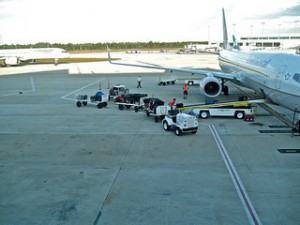The Absurdity of U.S. Air Travel: Baggage Fees
On the way home from visiting my brother-in-law’s family in Ohio, we changed planes in Chicago. To avoid the baggage fees, we, like most of our fellow passengers, schlepped our luggage through the airport to the gate in Dayton. Of course, we had to gate-check it because the overhead bins were long-full by the time we could board (boarding group: infinity). The plane arrived in Chicago late, we waited 20 minutes for our baggage to be unloaded, and then we sprinted to (and barely caught) our connecting flight to Boston. Naturally, we had to gate-check the luggage for that flight as well.
Baggage fees brought U.S. airlines in 2011 a total of $3.4 billion. That amount is almost one-half of the industry’s 2011 profits of $7 billion. To double the airlines’ profits, the social benefit of which is highly unclear, society incurs many costs:
- We spend time and effort schlepping luggage through the airport and the checkpoint security theater — a kind of demodernization where human (customer) labor replaces technology (conveyor belts and baggage trucks).
- TSA employees spend time scanning the luggage for water, baby formula, breast milk, and other dangerous substances.
- We take longer to board as we jostle for the few spots in packed overhead bins — or, finding no spot, we wriggle backward down the aisle to hand over the bag for gate checking.
- Airline employees spend time gate checking individual bags.
- Planes lose their scheduled takeoff slot because of the longer boarding time, thus increasing flight delays (unless turnaround times increase, which is also costly).
- Upon landing, in the rush to open the overhead bins, we risk heavy bags falling on our heads.
Should airlines be allowed to pass on these costs to society? Baggage charges are part of a larger change: Air travel, even economy class, was once a joy; now it’s an exercise in stoicism. Bring back the Civil Aeronautics Board!


Comments